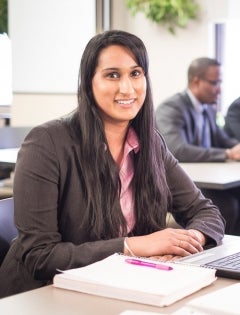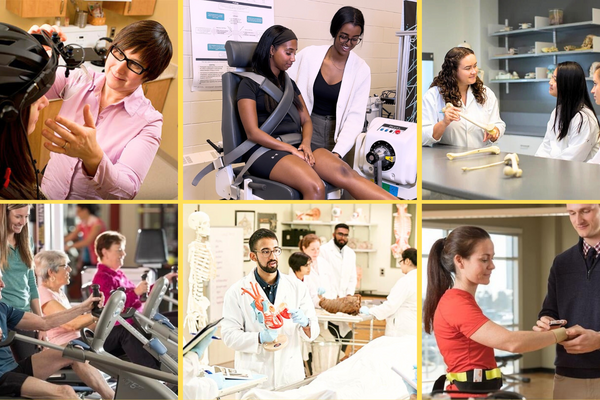Co-op education prepares graduate students for public service
Master of Public Service: Waterloo’s largest co-op education program for graduate students gives alumni an edge when competing for jobs at all levels of government
Master of Public Service: Waterloo’s largest co-op education program for graduate students gives alumni an edge when competing for jobs at all levels of government
By Katrina Schigas Marketing and Strategic CommunicationsIt was the real-world work experience in the University of Waterloo’s largest co-operative education program for graduate students that helped Rajbir Sian land a full-time job as a business development specialist when she graduated from the Master of Public Service program.
 Sian got her full-time position with the City of Waterloo after completing an eight-month co-op work term with the City as an economic development coordinator. The co-op term gave her an opportunity to use her skills in economic modelling while building a professional network at the same time.
Sian got her full-time position with the City of Waterloo after completing an eight-month co-op work term with the City as an economic development coordinator. The co-op term gave her an opportunity to use her skills in economic modelling while building a professional network at the same time.
“The co-op portion of the program is invaluable,” Sian said. “The way the program is structured using real-world examples and hands-on learning is extremely advantageous.” Her current position involves looking after business development, retention, and expansion in the City of Waterloo, including providing statistical analyses and developing economic strategies.
“With a 100% co-op employment rate in the last few years, our students in the master of public service program have been successfully matched to a diverse array of challenging and interesting positions in the federal, provincial, and municipal public services,” says Anindya Sen, program director and economics professor. “The co-op aspect of the program is vital as it ties classroom theory to the real world and gives students actual job experience, and in some cases, these positions have transitioned into permanent employment.”
In fact, co-op was the reason that Sian, who graduated in 2014, chose the program. She didn’t participate in co-op while completing her undergrad in political science at Waterloo, but heard about how beneficial it was from her peers. Although the graduate program was new – it was launched in September 2010 – she was attracted by the opportunity to apply theoretical skills in a practical setting while earning her degree.
But it isn’t just co-op that makes the program unique. Not only do students gain experience through their work terms, they also get to hear from current public service professionals, including government ministers and alumni, on a regular basis.
John Milloy, former Ontario cabinet minister and member of provincial parliament for Kitchener Centre, is currently a lecturer and manages the professional mentorship program. Additionally, the Honourable Navdeep Bains was an adjunct lecturer before he took on the role of Minister of Innovation, Science, and Economic Development, and the Honourable Bardish Chagger, Minister of Small Business and Tourism and Member of Parliament for Waterloo, recently participated in a Q&A session with students.
Chagger, an alumnus of Waterloo’s Faculty of Science, recently spoke at the Master of Public Service annual dinner and talk. She says Waterloo’s co-operative education program gives grad students an opportunity to experience the wide range of options available in the public service.
“Waterloo's master of public service program provides students with access to valuable experiential learning opportunities preparing them to become our future leaders in government at every level," says Minister Chagger.
Sian said, “Hearing from people in high-calibre positions puts the industry in perspective and legitimizes and reinforces what we are learning. We’re learning straight from the industry things that can’t be taught from a textbook.”
It also shows students the scope of public service opportunities available after graduation, notes Sian, which includes positions in the municipal government and not-for-profit sector as well as more commonly considered federal and provincial government roles.
“The program really prepares you to be knowledgeable and competitive in the real world,” said Sian. “When it comes time to get a job in the industry, you’re the best candidate out there.”

Read more
A Waterloo couple reflects on the campus that shaped their careers, their values, and their love story

Read more
To meet our AI ambitions, we’ll need to lean upon Canada’s unique strengths

Read more
From optometry and pharmacy to public health and therapeutics, Waterloo alumni are powering Canada’s health care sector
The University of Waterloo acknowledges that much of our work takes place on the traditional territory of the Neutral, Anishinaabeg, and Haudenosaunee peoples. Our main campus is situated on the Haldimand Tract, the land granted to the Six Nations that includes six miles on each side of the Grand River. Our active work toward reconciliation takes place across our campuses through research, learning, teaching, and community building, and is co-ordinated within the Office of Indigenous Relations.